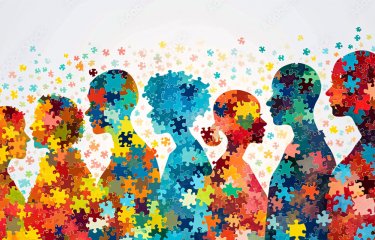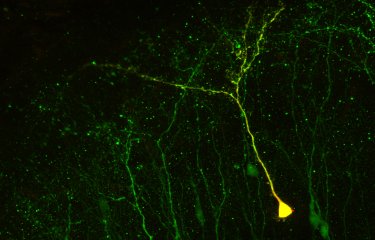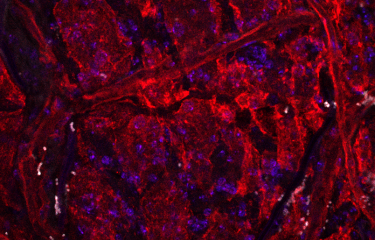Autism has been declared a major national cause for 2012, and will have a high profile in France throughout the whole year. Paradoxically, this syndrome – and its causes in particular – remains poorly understood. A study published on February 9, 2012, in Public Library of Science - Genetics, shows that genetic mutations interfering with communication between neurons are directly involved in the disorder. These new findings confirm the neurobiological origins of autism spectrum disorders. They are the result of a collaboration between researchers from the Institut Pasteur, CNRS, Inserm, the Paris Public Hospital Network (AP-HP), with the University of Paris Diderot, the Robert Debré hospital (AP-HP), the Gillberg Neuropsychiatry Centre (Sweden), the University of Ulm (Germany), the French National Genotyping Center at the CEA, and the FondaMental foundation.
Press release
Paris, febuary 9, 2012
Autism spectrum disorders (ASD) are a heterogeneous group of neurodevelopment disorders, the genetic origins of which are not well understood. Mutations in over one hundred genes have previously been associated with ASDs, but it is difficult to assess their precise roles in neural function and to rank them in order of their relative importance. Genetic analyses conducted at the Institut Pasteur have shown new mutations in the SHANK2 gene, which can go as far as the complete loss of one of its copies in some patients. The SHANK2 gene encodes a protein located in the synapses, the points of contact that allow neurons to communicate with each other.
Researchers have shown that, in neuron cultures, mutations of the SHANK2 gene are linked to a reduction in the number of synapses and therefore to impaired neuronal communication. Furthermore, more detailed analysis on 3 patients missing one copy of the gene highlighted other chromosomal anomalies, which are rare, but which have already been linked to other neuropsychiatric disorders.
“All these results underline the vital importance of synaptic genes in autism spectrum disorders,” explained Professor Thomas Bourgeron, head of the Human Genetics and Cognitive Functions Unit at the Institut Pasteur-CNRS. “Furthermore, they point towards the existence of modifier genes that could modulate the symptoms of disorders collectively known as ASD.”
These results provide significant confirmation of the role of genetic mutations in the onset and development of autism. More in-depth analyses will be needed to give a more specific description of these impairments as well as their interactions.
Partners
Institut Pasteur, France
CNRS, France
Université Denis Diderot Paris 7, France
Université de Ulm, Germany
Assistance Publique-Hôpitaux de Paris, Hôpital Robert Debré, France
INSERM, France
Université Pierre et Marie Curie Paris 6, France
Université de Lund, Sweden
Université de Gothenburg, Sweden
University College de Londres, United-Kingdom
Centre universitaire médical d'Utrecht, Netherlands
Université d'Oxford, United-Kingdom
Université de Helsinki, Finland
King’s College de Londres, United-Kingdom
German Cancer Research Center (DKFZ), Germany
Université Goethe, Germany
Université de Bologne, Italy
Université de Catagne, Italy
Institut de recherche clinique en neuropsychiatrie de l'enfant et de l'adolescent Stella Maris, Italy
Institut national de santé, Portugal
Institut Gulbenkian de science, Portugal
Center for Biodiversity, Functional and Integrative Genomics, Campus da FCUL, Lisboa, Portugal
Unidade Neurodesenvolvimento e Autismo, Centro Investigação e Formação Clinica, Hospital Pediátrico Coimbra e Faculdade Medicina, Universidade Coimbra, Portugal
The Centre for Applied Genomics and Program in Genetics and Genomic Biology, The Hospital for Sick Children, Toronto, Canada
Centre National de Génotypage, Evry, France
INSERM U771 and CNRS 6214, Angers, F-49000, France
Département de Biochimie et Génétique, Centre Hospitalier Universitaire, Angers, F-49000 France
CADIPA - Centre de Ressources Autisme Rhône-Alpes, Saint Egrève, France
Genetics Department, Hôpital Couple-Enfant, Grenoble, France
INSERM, U955, Psychiatrie Génétique, Créteil, 94000, France
Université Paris Est, Faculté de Médecine, Créteil, France
AP-HP, Hôpital H. Mondor - A. Chenevier, Département de Psychiatrie, Créteil, 94000, France
Institute of Child Health, University College London, London, UK
Fondation FondaMental, France
Source
Genetic and Functional Analyses of SHANK2 Mutations Suggest a Multiple Hit Model of Autism Spectrum Disorders
Claire S Leblond1,2,3, Jutta Heinrich4, Richard Delorme1,2,5, Christian Proepper4, Catalina Betancur6,7,8, Guillaume Huguet1,2,3, Marina Konyukh1,2,3, Pauline Chaste1,2,3, Elodie Ey1,2,3, Maria Rastam9, Henrik Anckarsäter10, Gudrun Nygren11, I. Carina Gillberg11, Jonas Melke12, Roberto Toro1,2,3, Beatrice Regnault13, Fabien Fauchereau1,2,3, Oriane Mercati1,2,3, Nathalie Lemière1,2,3, David Skuse14, Martin Poot15, Richard Holt16, Anthony P Monaco16, Irma Järvelä17, Katri Kantojärvi17, Raija Vanhala17, Sarah Curran18, David A Collier19, Patrick Bolton18,19, Andreas Chiocchetti20, Sabine M. Klauck20, Fritz Poustka21, Christine M. Freitag21, Regina Waltes21, Marnie Kopp21, Eftichia Duketis21, Elena Bacchelli22, Fiorella Minopoli22, Liliana Ruta23, Agatino Battaglia24, Luigi Mazzone25, Elena Maestrini22, Ana F. Sequeira26,27,28, Barbara Oliveira26,27,28, Astrid Vicente26,27,28, Guiomar Oliveira29, Dalila Pinto30, Stephen W Scherer30, Diana Zelenika31, Marc Delepine31, Mark Lathrop31, Dominique Bonneau32,33, Vincent Guinchat34, Françoise Devillard35, Brigitte Assouline34, Marie-Christine Mouren5, Marion Leboyer36,37,38, Christopher Gillberg11,39, Tobias M Boeckers4 and Thomas Bourgeron1,2,3*
1 Human Genetics and Cognitive Functions, Institut Pasteur, Paris, France
2 CNRS URA 2182 ‘Genes, synapses and cognition’, Institut Pasteur, Paris, France
3 University Denis Diderot Paris 7, Paris, France
4 Institute of Anatomy and Cell Biology, Ulm University, 89081 Ulm, Germany
5 Assistance Publique-Hôpitaux de Paris, Robert Debré Hospital, Department of Child and Adolescent Psychiatry, Paris, France
6 INSERM, U952, Paris, France
7 CNRS, UMR 7224, Paris, France
8 UPMC Univ Paris 06, Paris, France
9 Department of Clinical Sciences in Lund, Lund University, Lund, Sweden
10 Institute of Clinical Sciences, Lund University, Malmö, Sweden
11 Gillberg Neuropsychiatry Centre. University of Gothenburg, Göteborg, Sweden
12 Institute of Neuroscience and Physiology, Department of Pharmacology, Gothenburg University, Sweden.
13 Eukaryote Genotyping Platform. Genopole. Institut Pasteur, Paris, France
14 Behavioural and Brain Sciences Unit, Institute of Child Health, University College London, UK
15 Department of Medical Genetics, University Medical Center Utrecht, Utrecht, NL
16 Wellcome Trust Centre for Human Genetics, University of Oxford, Oxford, UK
17 Department of Medical Genetics, University of Helsinki, Helsinki, Finland
18 Academic Department of Child & Adolescent Psychiatry, Institute of Psychiatry, King’s College London, UK
19 Social Genetic Developmental Psychiatry Centre, Institute of Psychiatry, King’s College London, UK
20 Division of Molecular Genome Analysis, German Cancer Research Center (DKFZ), Heidelberg, Germany
21 Department of Child and Adolescent Psychiatry, Psychosomatics and Psychotherapy, Goethe University, Frankfurt am Main, Germany
22 Department of Biology, University of Bologna, Italy
23 Division of Child Neurology and Psychiatry, Department of Paediatrics, University of Catania, Catania, Italy
24 Stella Maris Clinical Research Institute for Child and Adolescent Neuropsychiatry, Calambrone (Pisa), Italy
25 Division of Child Neurology and Psychiatry, Department of Pediatrics, University of Catania, Catania, Italy
26 Instituto Nacional de Saude Dr Ricardo Jorge, Lisbon, Portugal
27 Instituto Gulbenkian de Ciencia, Oeiras, Portugal
28 Center for Biodiversity, Functional and Integrative Genomics, Campus da FCUL, Lisboa, Portugal
29 Unidade Neurodesenvolvimento e Autismo, Centro Investigação e Formação Clinica, Hospital Pediátrico Coimbra e Faculdade Medicina, Universidade Coimbra, Portugal
30 The Centre for Applied Genomics and Program in Genetics and Genomic Biology, The Hospital for Sick Children, Toronto, Canada
31 Centre National de Génotypage, Evry, France
32 INSERM U771 and CNRS 6214, Angers, F-49000, France
33 Département de Biochimie et Génétique, Centre Hospitalier Universitaire, Angers, F-49000 France
34 CADIPA - Centre de Ressources Autisme Rhône-Alpes, Saint Egrève, France
35 Genetics Department, Hôpital Couple-Enfant, Grenoble, France
36 INSERM, U955, Psychiatrie Génétique, Créteil, 94000, France
37 Université Paris Est, Faculté de Médecine, Créteil, France
38 AP-HP, Hôpital H. Mondor - A. Chenevier, Département de Psychiatrie, Créteil, 94000, France
39 Institute of Child Health, University College London, London, UK
Contacts
Nadine Peyrolo / +33 (0)1 45 68 81 47
Isabelle Kling / +33 (0)1 45 68 89 28
presse@pasteur.fr





